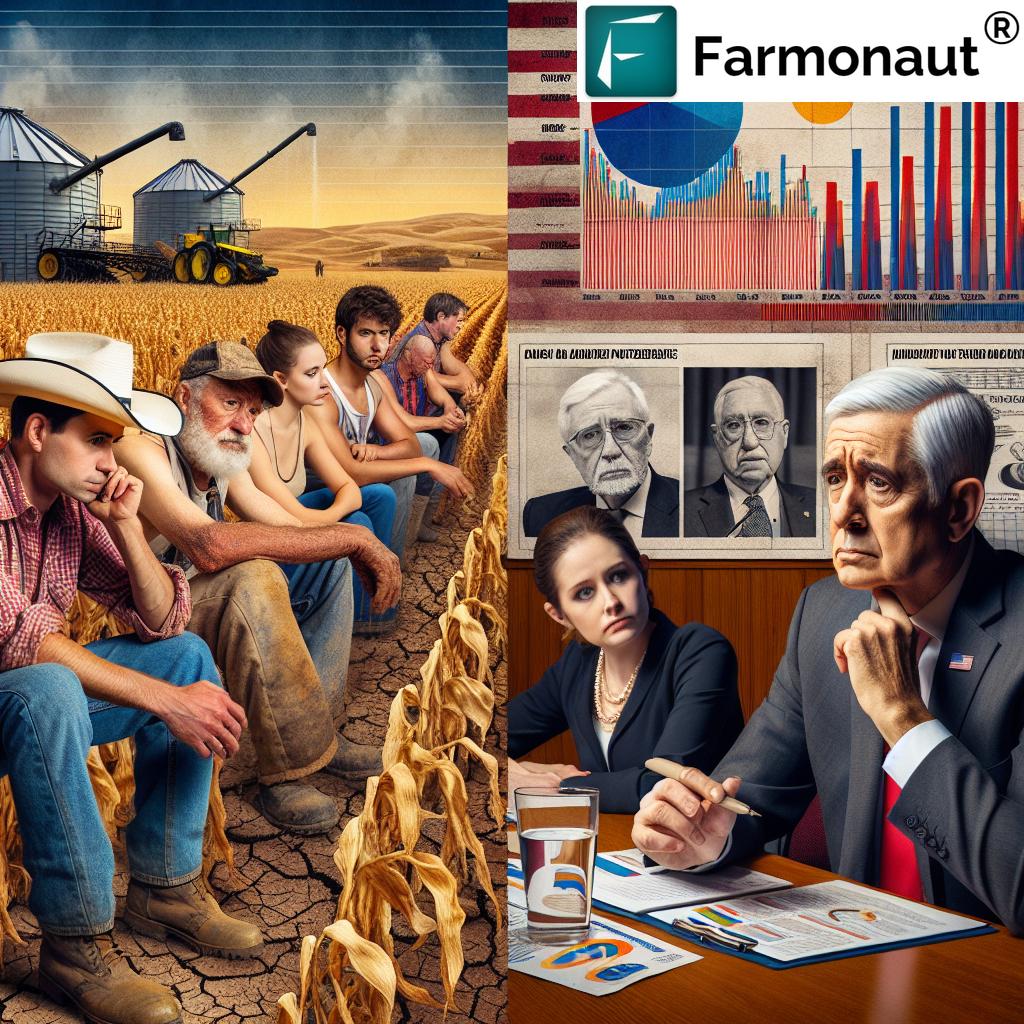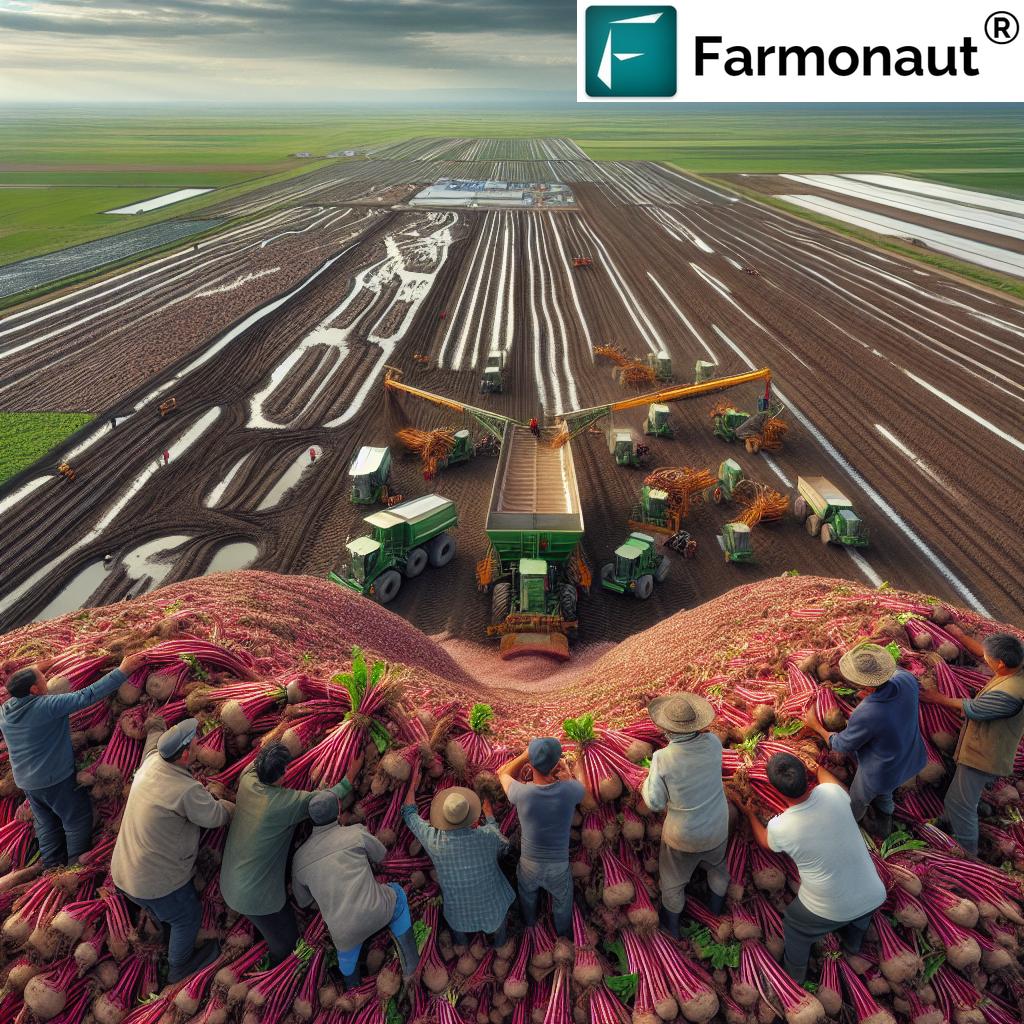Revealed: Iowa Farmers’ Struggle Under Biden’s Ag Policies – Grassley’s Urgent Call for Change

In the heartland of America, Iowa farmers are facing unprecedented challenges as they grapple with the impact of Biden-Harris agriculture policies. The once-thriving agricultural sector of Iowa is now at a crossroads, prompting Senator Chuck Grassley to voice his concerns and call for urgent action. This comprehensive report delves into the multifaceted issues affecting Iowa’s farming community and examines the potential solutions proposed by industry experts and policymakers.
The Decline in Farm Profitability: A Growing Concern
One of the most pressing issues facing Iowa farmers is the alarming decline in farm profitability. According to recent projections, net farm cash income is expected to plummet from a robust $176 billion in 2021 to a concerning $154 billion by 2024. This stark farm profitability decline has sent shockwaves through the agricultural community, leaving many farmers struggling to make ends meet.
- Factors contributing to the decline:
- Rising input costs
- Fluctuating commodity prices
- Increased regulatory burdens
As farmers grapple with these challenges, many are turning to innovative solutions to improve their operations. Farmonaut’s satellite-based crop monitoring app has emerged as a valuable tool for farmers seeking to optimize their yields and reduce costs.

The WOTUS Rule: A Regulatory Quagmire
Among the most contentious Biden-Harris agriculture regulations is the Waters of the United States (WOTUS) rule. This controversial policy has significant implications for land management practices, creating a complex web of regulations that many farmers find difficult to navigate.
The WOTUS rule impact on farming extends far beyond mere paperwork. It has the potential to:
- Limit farmers’ ability to make land improvements
- Increase compliance costs
- Create uncertainty in day-to-day operations
Senator Grassley has been vocal in his criticism of the WOTUS rule, arguing that it places an undue burden on farmers who are already struggling with thin profit margins. His Chuck Grassley agriculture advocacy efforts have focused on pushing for a more balanced approach to environmental regulation that takes into account the practical realities of modern farming.
Trade Agreements and Market Access: A Double-Edged Sword

The issue of trade agreements and agricultural market access has become a focal point in the debate over Iowa farmers Biden policies. The current administration’s approach to international trade has left many farmers concerned about their ability to compete in global markets.
A glaring indicator of these challenges is the record agricultural trade deficit of $30.5 billion. This deficit underscores the urgent need for improved market access and more favorable trade conditions for American agricultural products.
- Key factors contributing to the trade deficit:
- Insufficient bilateral trade agreements
- Non-tariff barriers in key export markets
- Increased global competition
To address these issues, Senator Grassley and other agricultural advocates are calling for a renewed focus on negotiating trade agreements that prioritize American farmers’ interests. They argue that improved agricultural market access is essential for the long-term viability of Iowa’s farming sector.
The Clean Fuels Tax Credit: A Potential Game-Changer
Amidst the challenges, there is a glimmer of hope in the form of the Clean Fuels tax credit. This initiative has the potential to provide a much-needed boost to Iowa’s agricultural economy, particularly in the biofuels sector. However, the lack of clear guidance on the implementation of this credit has left many farmers and industry stakeholders in limbo.
Senator Grassley has been at the forefront of calls for Clean Fuels tax credit guidance, emphasizing the need for:
- Clear and science-based guidelines
- Timely implementation to maximize benefits
- Consideration of the unique needs of small and medium-sized farms
The potential benefits of this tax credit extend beyond immediate financial gains. It could also play a crucial role in promoting sustainable farming practices and reducing the agricultural sector’s carbon footprint.
Sustainable Farming: Balancing Productivity and Environmental Stewardship
As the agricultural sector grapples with economic pressures and regulatory challenges, the importance of sustainable farming practices has come into sharp focus. Iowa farmers are increasingly recognizing the need to balance productivity with environmental stewardship.
Innovative technologies and practices are playing a crucial role in this transition. Farmonaut’s satellite-based API provides farmers with valuable insights into crop health, water stress, and soil conditions, enabling more efficient resource management.
Key areas of focus for sustainable farming include:
- Precision agriculture techniques
- Conservation tillage
- Integrated pest management
- Water-efficient irrigation systems
By adopting these practices, Iowa farmers are not only reducing their environmental impact but also improving their long-term economic viability.
Chuck Grassley’s Call to Action: A Voice for Iowa’s Farmers
Senator Chuck Grassley’s agriculture advocacy has been instrumental in bringing the plight of Iowa farmers to the national stage. His efforts have focused on several key areas:
- Pushing for reforms to the WOTUS rule
- Advocating for improved trade agreements
- Calling for clear guidance on the Clean Fuels tax credit
- Supporting initiatives to boost farm profitability
Grassley’s urgent call for change reflects the growing frustration among Iowa’s farming community with the current Biden-Harris agriculture policies. His advocacy serves as a rallying point for those seeking a more balanced approach to agricultural policy that supports both economic growth and environmental sustainability.
Looking Ahead: The Future of Iowa Agriculture
As Iowa farmers continue to navigate the challenges posed by current agricultural policies, the need for innovative solutions and supportive federal policies has never been more apparent. The future of Iowa’s agricultural sector will likely depend on a delicate balance between:
- Regulatory reform
- Improved trade conditions
- Adoption of sustainable farming practices
- Technological innovation
Tools like Farmonaut’s satellite weather API are becoming increasingly important in helping farmers adapt to changing conditions and optimize their operations.
As the debate over agricultural policy continues, the voices of Iowa farmers and their advocates will play a crucial role in shaping the future of American agriculture. The challenges are significant, but with the right policies and support, Iowa’s farming community has the potential to emerge stronger and more resilient than ever.
For farmers looking to stay ahead of these challenges, Farmonaut offers innovative solutions:


As Iowa’s agricultural sector faces these multifaceted challenges, the path forward will require collaboration, innovation, and a commitment to sustainable practices. The coming months and years will be crucial in determining the future of Iowa farming and its place in the global agricultural landscape.













